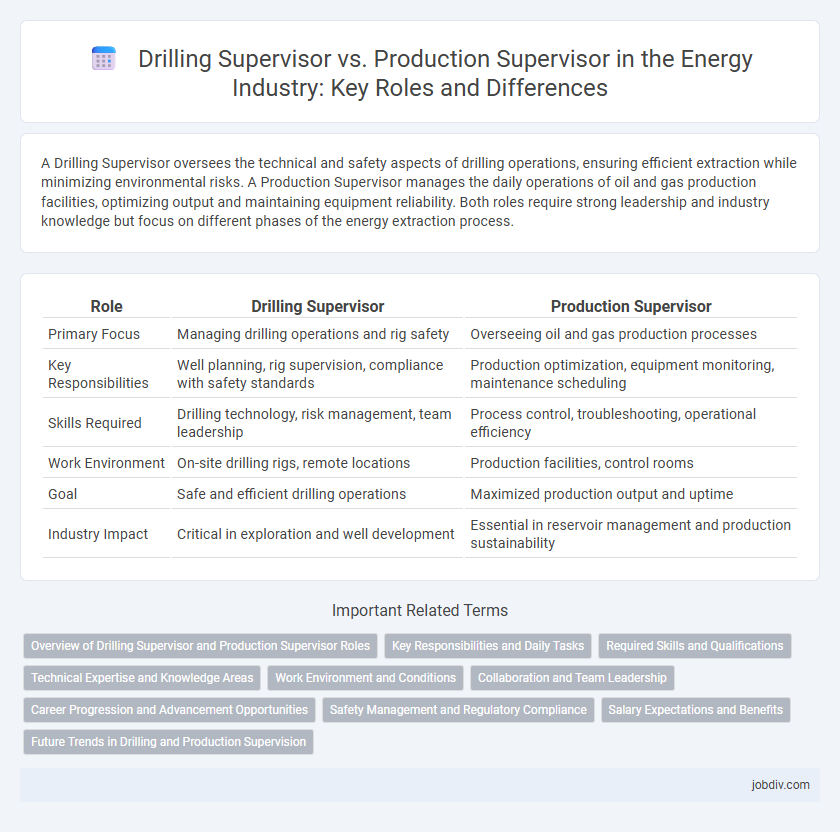A Drilling Supervisor oversees the technical and safety aspects of drilling operations, ensuring efficient extraction while minimizing environmental risks. A Production Supervisor manages the daily operations of oil and gas production facilities, optimizing output and maintaining equipment reliability. Both roles require strong leadership and industry knowledge but focus on different phases of the energy extraction process.
Table of Comparison
| Role | Drilling Supervisor | Production Supervisor |
|---|---|---|
| Primary Focus | Managing drilling operations and rig safety | Overseeing oil and gas production processes |
| Key Responsibilities | Well planning, rig supervision, compliance with safety standards | Production optimization, equipment monitoring, maintenance scheduling |
| Skills Required | Drilling technology, risk management, team leadership | Process control, troubleshooting, operational efficiency |
| Work Environment | On-site drilling rigs, remote locations | Production facilities, control rooms |
| Goal | Safe and efficient drilling operations | Maximized production output and uptime |
| Industry Impact | Critical in exploration and well development | Essential in reservoir management and production sustainability |
Overview of Drilling Supervisor and Production Supervisor Roles
Drilling Supervisors manage the entire drilling process, overseeing rig operations, ensuring safety compliance, and coordinating with engineers to optimize well placement and drilling efficiency. Production Supervisors focus on monitoring and maximizing hydrocarbon production, managing surface equipment, and troubleshooting production issues to enhance output and maintain regulatory standards. Both roles require expertise in oil and gas operations but specialize in different phases of the extraction lifecycle.
Key Responsibilities and Daily Tasks
Drilling Supervisors oversee the planning and execution of drilling operations, ensuring safety protocols and efficient resource allocation during well construction. Production Supervisors manage the operation and maintenance of production equipment, monitor output levels, and optimize hydrocarbon extraction processes to maximize reservoir recovery. Both roles require strict compliance with safety regulations and coordination with field teams to maintain operational continuity and address technical challenges.
Required Skills and Qualifications
Drilling Supervisors require extensive knowledge of drilling techniques, well control, and rig safety, often holding certifications such as Well Control Accreditation and a background in petroleum engineering or geology. Production Supervisors must excel in production optimization, equipment maintenance, and safety compliance, with expertise in flow assurance and reservoir management, frequently possessing degrees in chemical or mechanical engineering. Both roles demand strong leadership, problem-solving abilities, and experience in regulatory compliance within the oil and gas industry.
Technical Expertise and Knowledge Areas
Drilling Supervisors possess specialized technical expertise in wellbore design, drilling fluid dynamics, and rig equipment operations, ensuring safe and efficient drilling processes. Production Supervisors focus on reservoir management, production optimization, and surface facility operations, applying advanced knowledge in flow assurance and artificial lift techniques. Both roles require a deep understanding of safety protocols and regulatory compliance within the oil and gas industry.
Work Environment and Conditions
Drilling Supervisors operate primarily on rig sites, often exposed to harsh weather, high noise levels, and the physical demands of managing drilling operations around the clock. Production Supervisors work mainly in processing facilities or production sites, facing environments with complex machinery, safety protocols, and continuous monitoring of production flow. Both roles require adherence to strict safety standards, but Drilling Supervisors typically encounter more dynamic and physically demanding conditions.
Collaboration and Team Leadership
Drilling Supervisors and Production Supervisors play crucial roles in the energy sector, ensuring efficient operations through collaborative leadership. Drilling Supervisors manage well drilling activities, coordinating with geologists and engineers to optimize drilling processes while Production Supervisors oversee daily production operations, maintaining safety and maximizing output. Their synergy fosters seamless communication, risk management, and problem-solving, enhancing overall operational efficiency and team performance.
Career Progression and Advancement Opportunities
Drilling Supervisors typically advance by gaining expertise in managing complex drilling operations and safety protocols, positioning themselves for senior supervisory or project management roles within exploration and drilling companies. Production Supervisors progress by optimizing extraction processes and enhancing production efficiency, often moving into operations management or plant superintendent positions in oil and gas production facilities. Career growth in both roles depends on acquiring technical certifications, leadership skills, and industry experience relevant to upstream and midstream energy sectors.
Safety Management and Regulatory Compliance
Drilling Supervisors implement rigorous safety protocols at well sites, ensuring compliance with industry standards such as OSHA and API regulations to mitigate risks during drilling operations. Production Supervisors oversee continuous monitoring of well production processes, enforcing safety measures aligned with environmental regulations and internal health and safety policies. Both roles require thorough knowledge of regulatory frameworks and proactive hazard identification to maintain operational safety and prevent incidents in the energy sector.
Salary Expectations and Benefits
Drilling Supervisors typically command higher salary expectations due to the specialized technical skills and hazard management required on drilling sites, with average annual earnings ranging from $90,000 to $130,000. Production Supervisors earn between $75,000 and $110,000, reflecting their focus on overseeing operational efficiency and output in production facilities. Benefits for both roles often include comprehensive health insurance, performance bonuses, retirement plans, and travel allowances, with Drilling Supervisors more likely to receive hazard pay and site-specific allowances.
Future Trends in Drilling and Production Supervision
Future trends in drilling supervision emphasize the integration of advanced automation technologies and real-time data analytics to enhance operational efficiency and safety. Production supervisors increasingly adopt predictive maintenance systems and AI-driven monitoring tools to optimize resource extraction and minimize downtime. Both roles are evolving to incorporate digital twins and remote operations, driving a shift towards more sustainable and cost-effective energy production methods.
Drilling Supervisor vs Production Supervisor Infographic

 jobdiv.com
jobdiv.com